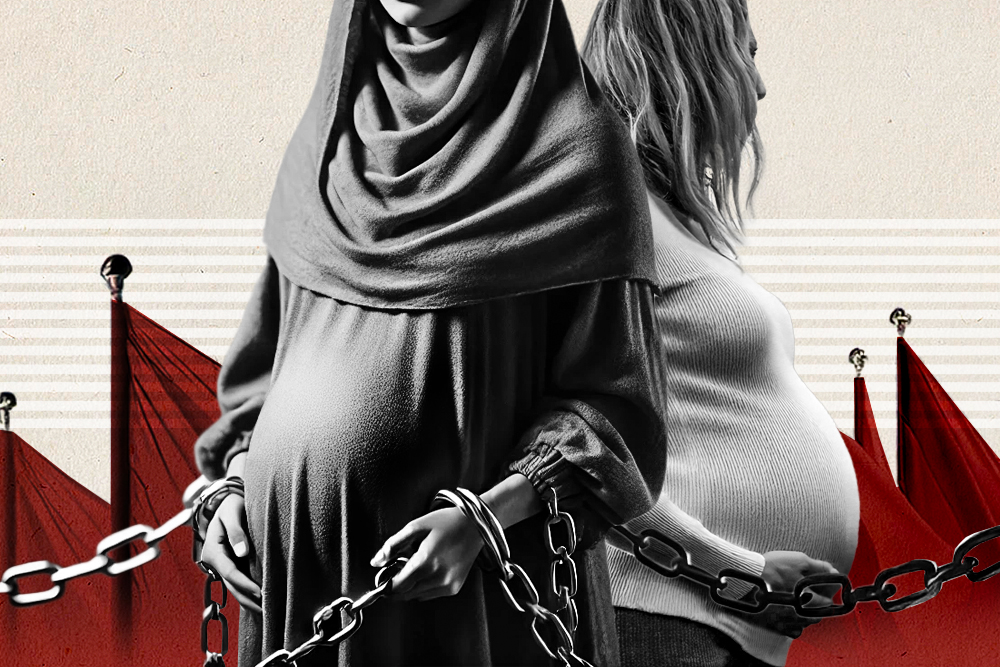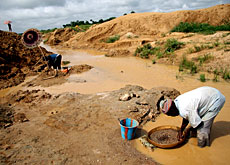Mugabe holds tricky hand in clean diamond trade

The United Nations should declare an embargo against "blood diamonds" linked to Zimbabwean president Robert Mugabe, two non-governmental agencies have declared.
Partnership Africa Canada (Pac) and Global Witness have published a report saying Mugabe’s seizure of the country’s mines has compromised the Kimberley Process, a system Switzerland helped create in order to decouple diamonds from war.
A harsh report called, “Zimbabwe, Diamonds and the Wrong Side of History” claims that Zimbabwe’s diamond trade has fuelled corruption and severe human-rights violations. The study, published in March, concluded that Zimbabwe is in no position to manage the trade ethically.
Zimbabwe’s official statistics show that the country is supposed to have a stock of diamonds equivalent to 1.33 million carats worth at least $150 million (SFr162 million).
“The Security Council of the United Nations [should] intervene, as it did in the case of diamonds in Angola, Sierra Leone, Liberia and the Ivory Coast, and impose an embargo on Zimbabwean diamonds until a legitimate and competent government is established,” the report states.
It describes in detail the horrors and growing misery surrounding the diamond trade in the struggling country, adding that the gems have become “an important factor in Robert Mugabe’s attempt to retain power”.
“Diamond smuggling is widespread and dozens of miners have been killed by soldiers who now control the major mines in the country,” it states.
The authors argue that the 47 countries behind the Kimberley Process, including those in the European Union, working to regulate the trade in rough diamonds have “neither the will nor the interest to tackle the problem”.
Stunning resignation
Ian Smillie is disgusted. As Pac’s research coordinator and NGO representative at the Kimberley Process, Smillie has announced his resignation. The Canadian economist is one of the principal architects of the Kimberley Process but he has turned his back on it.
“I was convinced in 2003 that we had created an effective mechanism,” he told swissinfo.ch. “That is indeed the case, but we have let it slip. All these years, the states participating in the process have failed to deal with these serious cases of contraband from Brazil, the Ivory Coast, Ghana, Venezuela, Zimbabwe, Guinea, Lebanon.”
“For Venezuela we have even come to tolerate it, while our system is supposed to prevent it,” he said. “Governments talk endlessly about whether or not to address the issue of human rights, while the crimes continue on site. I don’t want to condone it.”
Smillie’s resignation is “a great loss”, says Roland Vock, head of the Swiss delegation to the Kimberley Process.
“Ian Smillie was the NGO flag bearer,” Vock said. “We have always appreciated his clear positions, even if governments weren’t always pleased. To his credit he was a realist.”
Unrealistic
For the State Secretariat for Economic Affairs (Seco), an embargo is hardly realistic.
“I understand the demands of the NGOs,” Vock said. “But the political resistance is too strong within the UN Security Council to place sanctions against Zimbabwe. There is an embargo on the country by the European Union, Switzerland and the USA since 2002, but it focuses on military and security forces, as well as the freezing of bank assets of certain people who are on a black list with us. But trade isn’t affected.”
Complicating the matter further is the fact that Zimbabwe is a member of the Kimberley Process, making it very difficult to exclude.
“The Kimberley Process policy is to work to influence the countries internally,” Vock said.
Following the publication of the report, which includes several accounts from witnesses concerning atrocities in the Marague region where small-scale miners have been forcibly displaced, the World Federation of Diamond Bourses (WFDB), has banned the sale of jewels from the eastern part of the country.
“It’s the last straw that we – Kimberley – are lagging behind compared with the diamond industry that is taking suitable measures,” Smillie said. The economist also deplores that the NGOs are obliged to carry out investigations instead of Kimberley teams.
Pre-cursors
The alarm was already triggered in 2006, when a UN report revealed Ivory Coast blood diamonds had leaked onto the market.
“Not only was the Kimberley Process unable to identify the problem, but it also showed that gaps in a few governments’ controls could endanger the entire system,” Smillie said.
Franck Notari, founder of the GemTechLab in Geneva, regrets Smillie’s departure but says there is no use in throwing the baby out with the bathwater.
“Kimberley is a structure that is already in place that raises awareness, even if it isn’t optimal,” he said. “I think it shouldn’t be abandoned so quickly.”
According to Vock, the numbers speak for themselves. In the mid-1990s, 15 per cent of the diamond trade was linked to war, he said. When the Kimberley Process was started in 2003, it was down to four per cent. Today it is around 0.1 per cent.
“At the same time, I understand Ian Smillie,” Vock said. “He was at the start of the process. We were looking for pragmatic solutions. Over the years and with more than 70 countries participating today, the process has become somewhat bureaucratic. It’s certainly very frustrating for the NGOs.”
Meanwhile, Smillie admits that the certification system has helped to get a clean diamond trade on its feet in many countries, notably in transit hubs like Belgium and Switzerland.
“Ten years ago all manner of diamonds with murky origins arrived in customs zones at Geneva and Zurich airports and then left with Swiss labels,” he said. “That is not possible now.”
Carole Vann and Michael Deibert, swissinfo.ch/InfoSud-IPS (Translated from French by Tim Neville)
Launched in 2000 by South Africa, negotiations culminated in 2002 in Interlaken with the adoption of an international certification system for rough diamonds mined and sold legally. This system, called the Kimberley Process, was put into effect in 2003.
Since then, all rough-diamond exports must be accompanied by certificates that show precautions were taken that the shipment contains no conflict diamonds. States which do not apply this certification system are excluded from the rough-diamond trade.
Presently 47 countries including the European Union participate in the system. Switzerland is a founding member. Any decision concerning the Kimberley Process must be taken by consensus.
The system has no legal binding. The founding document provides only an outline for the certification system and leaves it up to participants to decide how to implement it.
In Switzerland the implementation of the certification system is done through an ordinance on the international trade in rough diamonds, which regulates the import, export, transit and customs warehousing. The State Secretariat for Economic Affairs (Seco) is responsible for overseeing the Kimberley Process in Switzerland.
Until late 2001, Switzerland was – after Belgium and Britain – the third commercial centre of the diamond trade in Western Europe. De Beers is located in Lucerne.
At the end of 2001, De Beers moved most of its activities to London. Consequently, diamond imports dropped and Switzerland lost its role as a significant player in the international trade of rough diamonds.
However, the value of rough diamonds stored in customs warehouses has remained high. Customs zones at Zurich and Geneva airports play a sizable role in the diamond trade.

In compliance with the JTI standards
More: SWI swissinfo.ch certified by the Journalism Trust Initiative











You can find an overview of ongoing debates with our journalists here . Please join us!
If you want to start a conversation about a topic raised in this article or want to report factual errors, email us at english@swissinfo.ch.